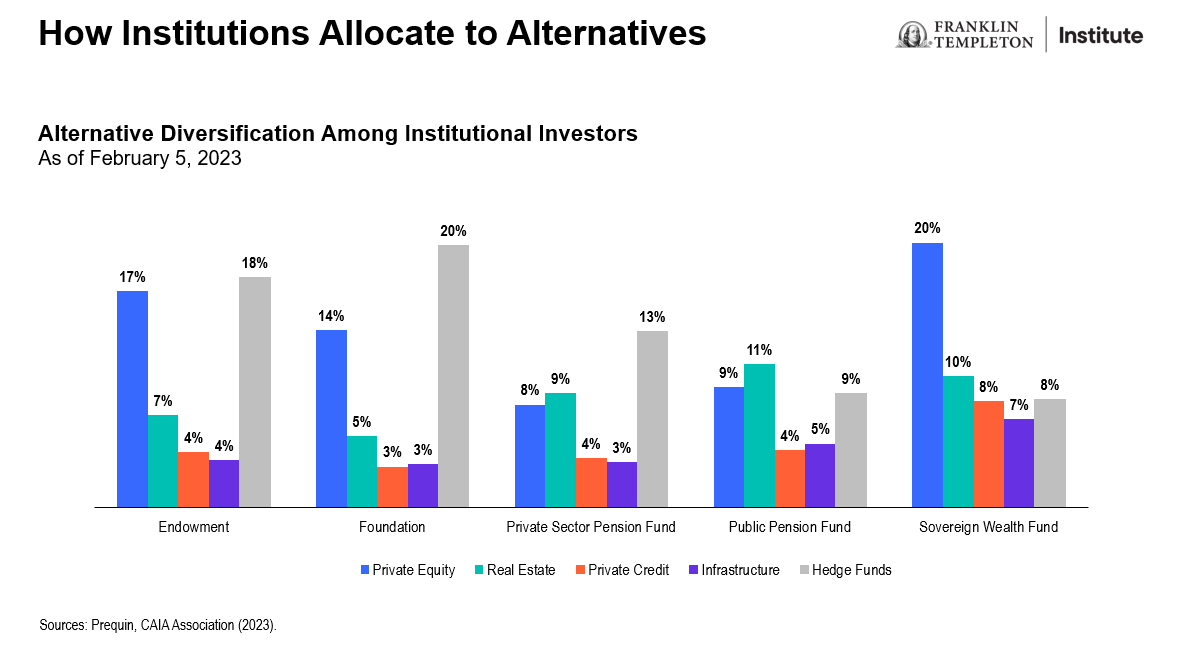We recently hosted a group of global institutional clients for an educational event in our San Mateo, CA, headquarters. Our clients joined us from 23 different countries including Singapore, the Philippines, Thailand, Brazil, Mexico, Chile, Saudi Arabia, South Africa and Malaysia. The program highlighted the depth and breadth of resources offered by Franklin Templeton and our Specialist Investment Managers (SIMs), and we examined the global economies, capital markets and opportunities across traditional and alternative investments.

I served as the host and moderator on a dedicated day focused on alternative investments and began the day by highlighting the alternative allocations across institutional segments (see the chart below). Consistent with our clients, institutions have varying degrees of allocations based on their size, access and the sophistication of the investment committee.
The allocations also vary by institutional segment. Pension plans (public and private) can model their cash flow needs due to the predictable nature of retirement distributions. Endowments, foundations and sovereign wealth funds’ time horizons are often viewed in perpetuity. Consequently, their respective allocations vary based on the amount of assets allocated to alternatives and the types of alternative investments included.

While the program was attended by institutional clients, there were certain messages that apply to all client segments. The merits of alternative investments are universal; however, the way that they are used by institutions and individuals varies based on access, eligibility, risk appetite and liquidity needs among other issues. These were some of the valuable lessons learned from institutions:
- Establish a goal, or desired outcome, for each investment before allocating.
- Evaluate strategy and structure—both are important.
- Develop a process for evaluating each underlying investment.
- Due diligence should include investment and operational due diligence.
- Understand the liquidity of the underlying investment.
- Evaluate the current environment to determine how each investment should perform.
Throughout the day, our clients were engaged in challenging the various experts regarding the growing alternative marketplace, which asset classes present the best opportunities, and how to evaluate and incorporate alternatives appropriately.
In future articles, we will examine the opportunities in secondaries, alternative credit strategies and the diversity of commercial real estate. Please visit our Knowledge Hub to access additional information Knowledge hub | Alternatives by FT.
WHAT ARE THE RISKS?
All investments involve risks, including possible loss of principal. Alternative strategies may be exposed to potentially significant fluctuations in value.
IMPORTANT LEGAL INFORMATION
This material is intended to be of general interest only and should not be construed as individual investment advice or a recommendation or solicitation to buy, sell or hold any security or to adopt any investment strategy. It does not constitute legal or tax advice. This material may not be reproduced, distributed or published without prior written permission from Franklin Templeton.
The views expressed are those of the investment manager and the comments, opinions and analyses are rendered as at publication date and may change without notice. The underlying assumptions and these views are subject to change based on market and other conditions and may differ from other portfolio managers or of the firm as a whole. The information provided in this material is not intended as a complete analysis of every material fact regarding any country, region or market. There is no assurance that any prediction, projection or forecast on the economy, stock market, bond market or the economic trends of the markets will be realized. The value of investments and the income from them can go down as well as up and you may not get back the full amount that you invested. Past performance is not necessarily indicative nor a guarantee of future performance. All investments involve risks, including possible loss of principal.
Any research and analysis contained in this material has been procured by Franklin Templeton for its own purposes and may be acted upon in that connection and, as such, is provided to you incidentally. Data from third party sources may have been used in the preparation of this material and Franklin Templeton (“FT”) has not independently verified, validated or audited such data. Although information has been obtained from sources that Franklin Templeton believes to be reliable, no guarantee can be given as to its accuracy and such information may be incomplete or condensed and may be subject to change at any time without notice. The mention of any individual securities should neither constitute nor be construed as a recommendation to purchase, hold or sell any securities, and the information provided regarding such individual securities (if any) is not a sufficient basis upon which to make an investment decision. FT accepts no liability whatsoever for any loss arising from use of this information and reliance upon the comments, opinions and analyses in the material is at the sole discretion of the user.
Products, services and information may not be available in all jurisdictions and are offered outside the U.S. by other FT affiliates and/or their distributors as local laws and regulation permits. Please consult your own financial professional or Franklin Templeton institutional contact for further information on availability of products and services in your jurisdiction.
Issued in the U.S. by Franklin Distributors, LLC, One Franklin Parkway, San Mateo, California 94403-1906, (800) DIAL BEN/342-5236, franklintempleton.com – Franklin Distributors, LLC, member FINRA/SIPC, is the principal distributor of Franklin Templeton U.S. registered products, which are not FDIC insured; may lose value; and are not bank guaranteed and are available only in jurisdictions where an offer or solicitation of such products is permitted under applicable laws and regulation.

